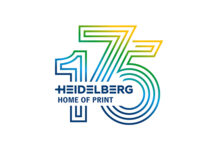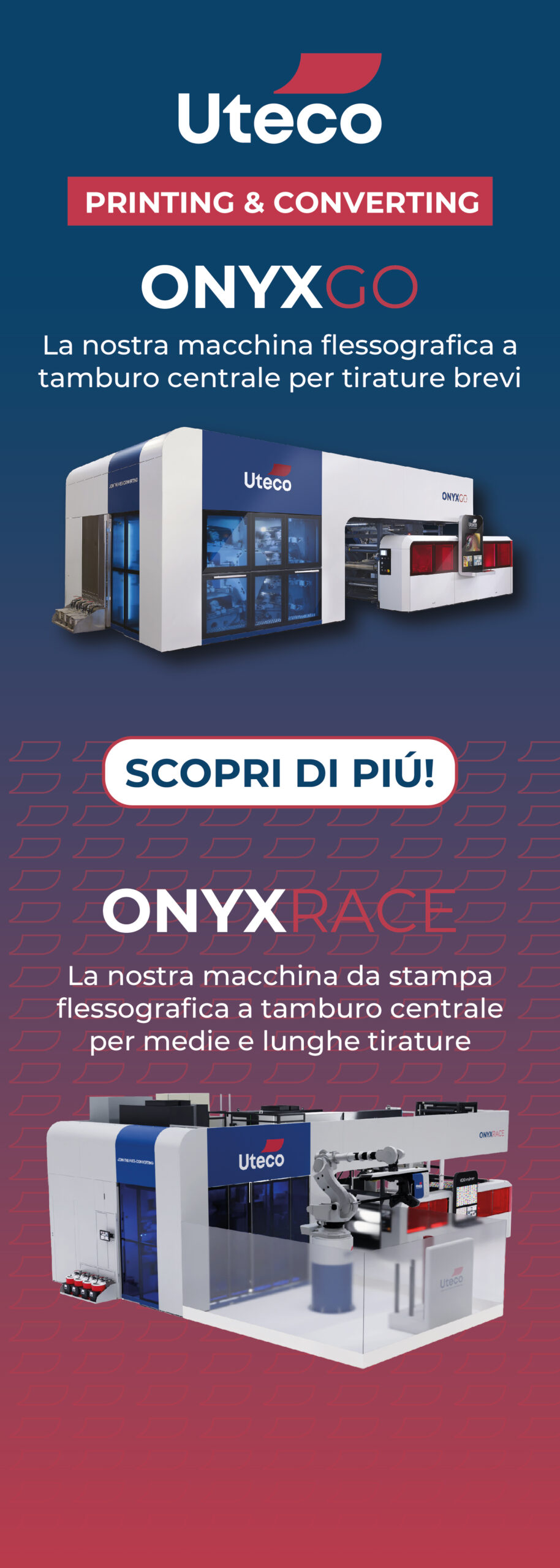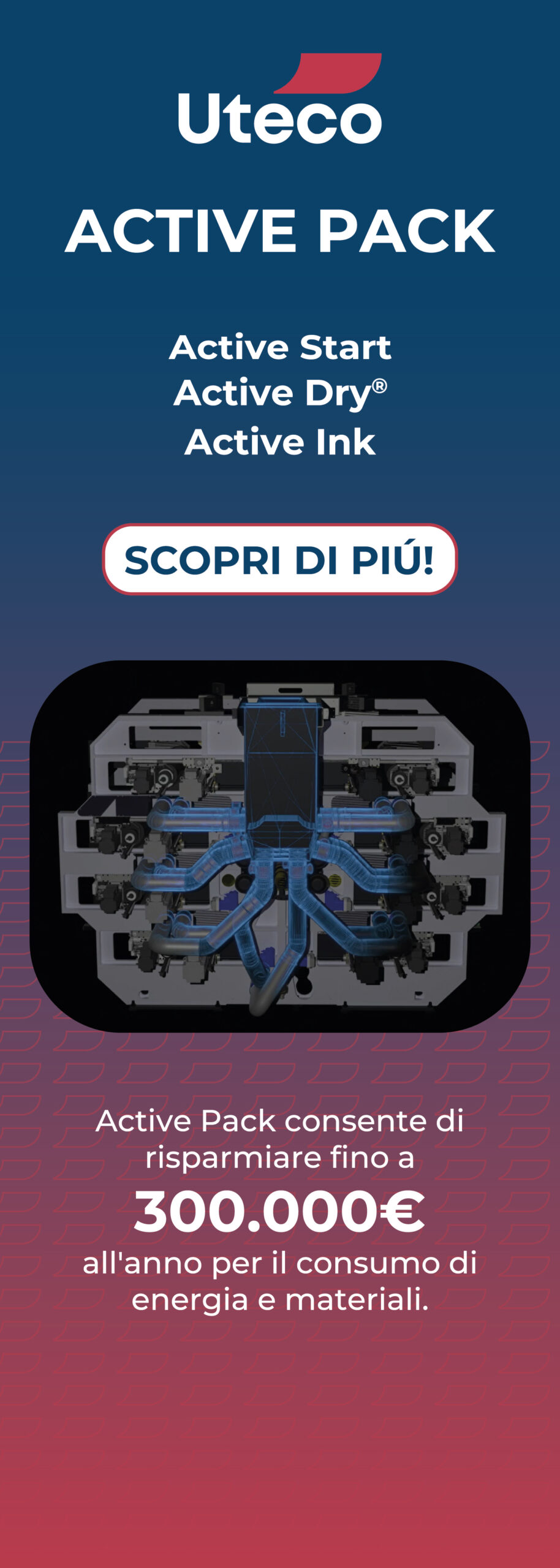 At latest edition of SMAU Napoli 2022 (December 15-16), Italian Printing Inks, better known as IPINKS, won the innovation award for presenting a printing ink that uses solvents from edible oil waste. A virtuous process carried out by the Caserta-based company, extremely lively in the search for new solutions to offer to the packaging printing market
At latest edition of SMAU Napoli 2022 (December 15-16), Italian Printing Inks, better known as IPINKS, won the innovation award for presenting a printing ink that uses solvents from edible oil waste. A virtuous process carried out by the Caserta-based company, extremely lively in the search for new solutions to offer to the packaging printing market
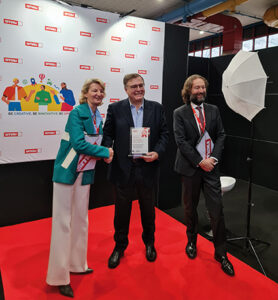 The Smau Innovation Award is a recognition that rewards the great propensity for innovation of Italian companies, regardless of the sector in which they operate, in particular projects related to sustainability and open innovation, capable of bringing benefits to their business through collaboration with startups and innovative companies in a logic of partnership.
The Smau Innovation Award is a recognition that rewards the great propensity for innovation of Italian companies, regardless of the sector in which they operate, in particular projects related to sustainability and open innovation, capable of bringing benefits to their business through collaboration with startups and innovative companies in a logic of partnership.
The company that has always made product innovation one of its flagships is Italian Printing Inks, a relatively young company, founded in 2013 by Aldo and Vincenzo de Luca, taking up the historic legacy of the family company Fonderia Tipografica Meridionale founded in 1896 always in the world of the production of printing inks. Ipinks has its headquarters in Marcianise (CE). In 2018 it also began producing inks for water-based digital printing. The reference market is mainly the Italian one (70%) but the company also operates in Portugal, Eastern Europe, Greece, Algeria and Egypt.
Zero waste INKS
The European demand for printing inks is about 1 million tons per year, 250,000 of which concern inks formulated based on vegetable solvents. These inks are now used for printing in contact with food and are based on vegetable oil esters. These are solvents deriving from crops that consume soil, resources and, above all, are used by the food industry, and we know that for sustainability, subtracting precious food resources is never an aspect to be considered positive.
 “The “Zero waste INKS” project, born from the synergy between IPINKS and the Department of Chemical Sciences of Naples with the Metallorganic Chemistry group that has been dealing with the converting of waste oils for years, has set itself the goal of reducing impact on the environment of these inks. After a series of successful tests and publications, “green” solvents derived from third-generation biomass residues (food waste) have been patented for the formulation of environmentally friendly inks in a circular economy perspective”, tells us Vincenzo Benessere, R&D manager at IPINKS.
“The “Zero waste INKS” project, born from the synergy between IPINKS and the Department of Chemical Sciences of Naples with the Metallorganic Chemistry group that has been dealing with the converting of waste oils for years, has set itself the goal of reducing impact on the environment of these inks. After a series of successful tests and publications, “green” solvents derived from third-generation biomass residues (food waste) have been patented for the formulation of environmentally friendly inks in a circular economy perspective”, tells us Vincenzo Benessere, R&D manager at IPINKS.
Studies
By observing the similarity between the molecules used in the printing inks that IPINKS produced and the waste oil derivatives made in the University’s laboratory, the company has supported tests and studies since 2017 to understand if these new products could be included in the system in place of those in use that are decidedly less environmentally friendly.
The results were surprising, the solvent power was much higher and in 2019 the first important production was started with positive effects both in printing on food packaging and for commercial and editorial products.
This is where the startup IsusChem was born which, thanks also to an important funding from the State, built a plant to produce this family of solvents deriving from waste oils on a semi-industrial scale.
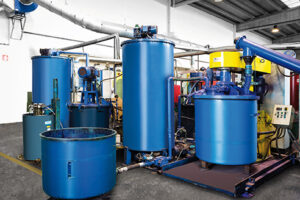
Innovative applications
Once the potential of this new family of solvents was learned, IPINKS invested and supported from a technological point of view further studies of the University in various application fields.
Other patents have been born in the graphic sector and beyond, with product but also process innovation: washing solvents have been created for printing machines/surfaces and, in the last year, a very low-cost recyclable catalyst has also been developed which supplies esters to make UV inks. The sectors in which studies are underway range from cosmetics, for example in formulations for sunscreens or hair treatment products, to the production of coatings for ceramics.
 Benefits
Benefits
The innovation makes printing products 35-40% more sustainable from the point of view of the use of solvents. In fact, 35-40% of the formulation of a printing ink comes from a vegetable-based raw material which however consumes soil and competes with the cultivation of food products. It is a renewable raw material but not ethically and environmentally sustainable. Using esters that derive from waste oils reduces the environmental impact, increases the sustainability of the inks and makes a product such as used frying oil more noble, which would otherwise be destroyed in waste-to-energy plants In this way, moreover, even the packaging on which the ink is used becomes more sustainable.
Not only that, because the use of these esters makes the production of printing inks faster and less energy-consuming. Suffice it to say that the dissolution process takes place on average in 4 hours at a temperature of 120°, with the new solvents instead in 30 minutes and at a temperature of 80°.
Thanks to their extraordinary characteristics, these products not only replace something already existing but open up new markets both in the printing sector and in other fields.
Finally, the new green inks do not migrate into food and have an eco-toxicological profile which makes them suitable for use in food packaging. They are not flammable or cause irritation: they do not need any special precautions to be handled and this is an advantage for the safety of the operators who use them.
 Face to face with Vincenzo Benessere, R&D manager at IPINKS
Face to face with Vincenzo Benessere, R&D manager at IPINKS
In addition to the obvious environmental advantages, are the new inks also competitive from an economic point of view?
“In a context of fluctuating prices, it is not possible to compare solvents from vegetable oils currently used and those deriving from waste oils. Clearly what happens in an economy that is not yet of scale, such as that of waste oils and their derivatives, prices tend to be higher for the raw material that we buy but the final product is not affected because the higher solvent power of these substances requires the use of smaller quantities”.
On which types of packaging can these inks be used (paper, flexible film, labels…)?
“The inks that we produce with solvents from waste oils can be used on coated and uncoated paper and cardboard, but also on label paper and not-absorbent substrates such as, for example, the polycoated cardboards widely used in the paper cup sector. This last application is the most noble and with high added value for our inks because current inks are very high in viscosity and difficult to use. Our inks, on the other hand, have a standard rheological profile that is very similar to conventional offset inks. The reason is the exceptional solvent power of the products we use with the advantage that this solvent power is not to the detriment of users and the environment”.

Are the products already available in your range and therefore usable by your customers?
“Our products are already available and we will have significant growth in 2023 as the production of these solvents from waste oils will grow a lot thanks to our key partner Isuschem which together with us owns the intellectual property of product and process”.
From a printability point of view, have you noticed complications or differences compared to a traditional product?
“As previously mentioned, the printability characteristics of these inks come from the exceptional (and patented) solvent power of the substances we use. This higher solvent power allows us to use a very flexible and high-performance formulation at high printing speeds with truly amazing drying characteristics even on not-absorbent substrates”.
Again for the packaging sector, are you studying further news for the new year?
“In 2023 we will also start the production of inks for the UV sector containing solvents from a sustainable process and therefore with a significantly reduced environmental impact compared to current solutions on the market”.










